Don't wanna be here? Send us removal request.
Text


your unusual behavior…
31 notes
·
View notes
Text
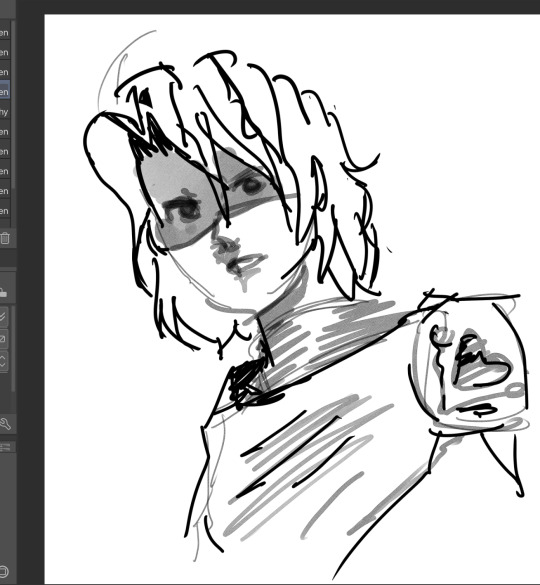
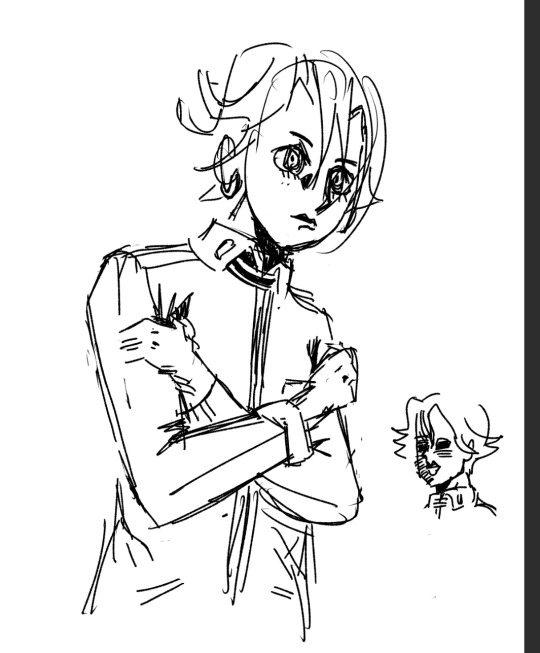
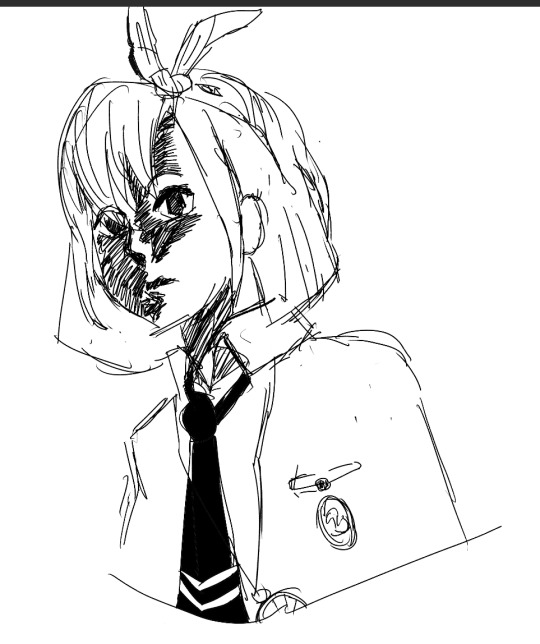
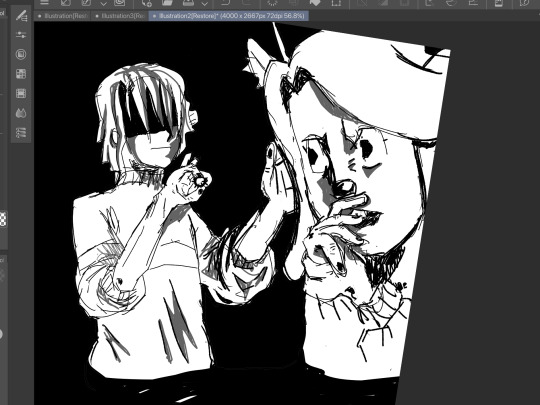
Recent doodles
#persona series#persona 1#maki sonomura#naoya toudou#boy with earring#kris dreemurr#noelle holiday#deltarune#snowgrave
11 notes
·
View notes
Text
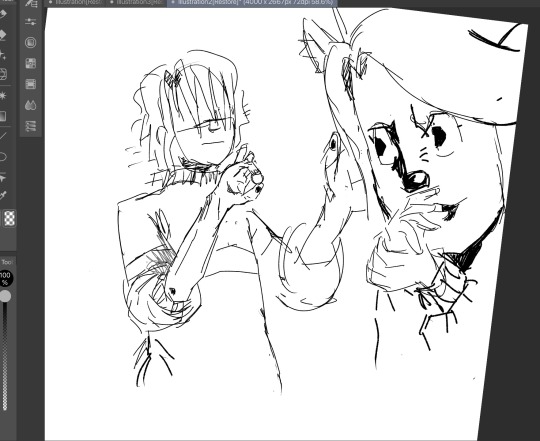
The thornring. (WIP)
7 notes
·
View notes
Text
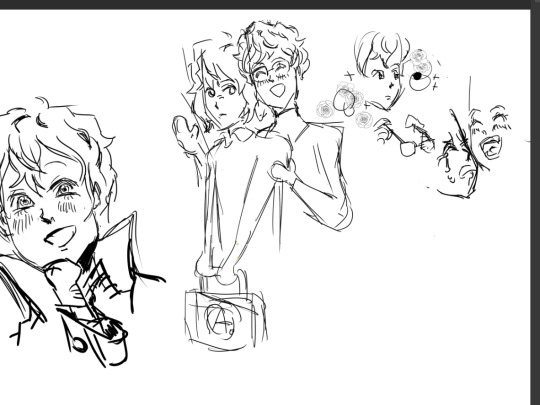
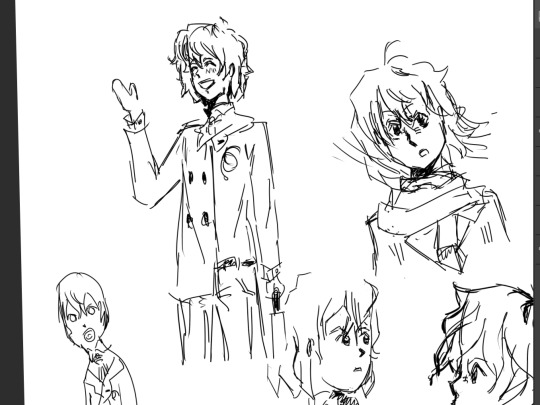
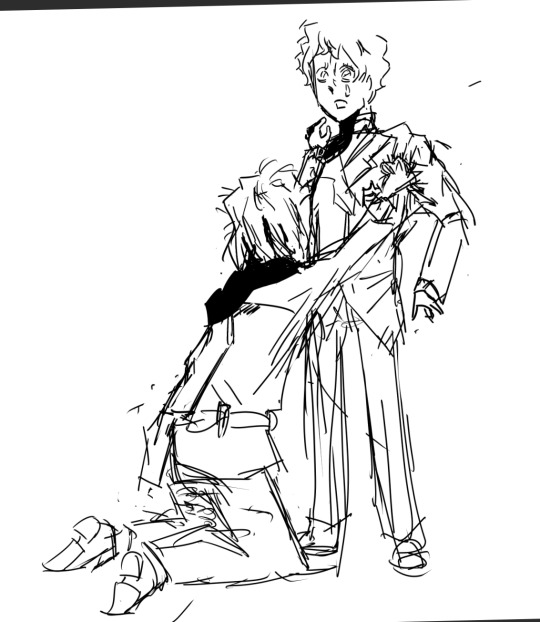
Few doodles im bad at drawing when i feel least bored, its hard to force my hand
33 notes
·
View notes
Text
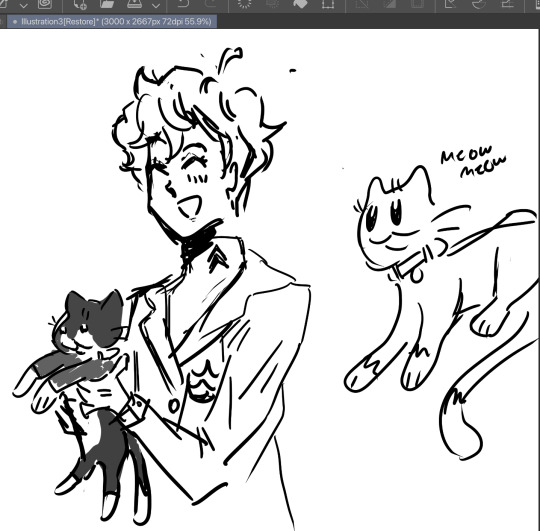
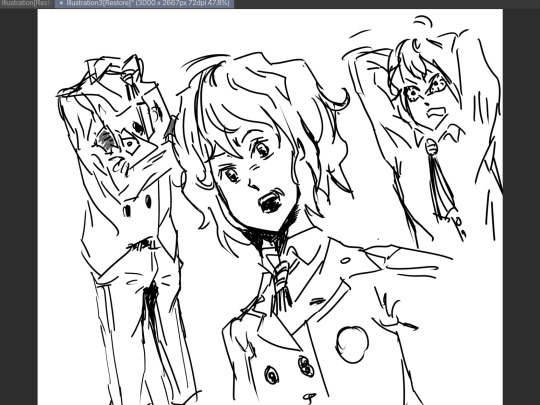
Short doodles
26 notes
·
View notes
Text
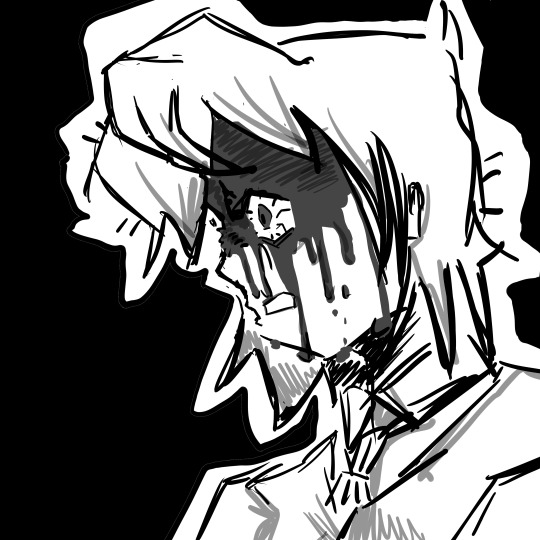
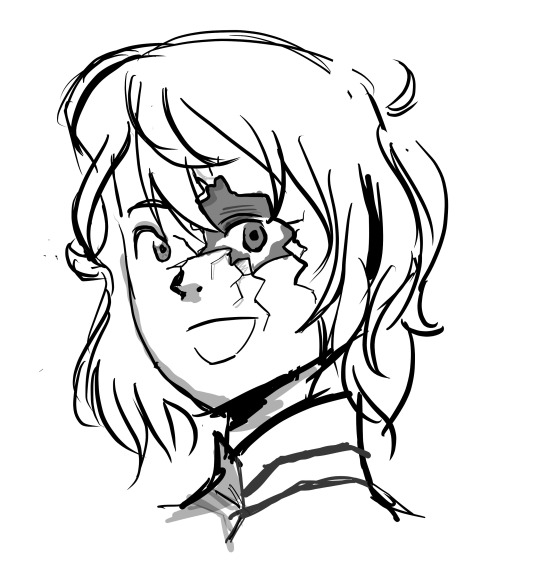
Akechi goro
11 notes
·
View notes
Text
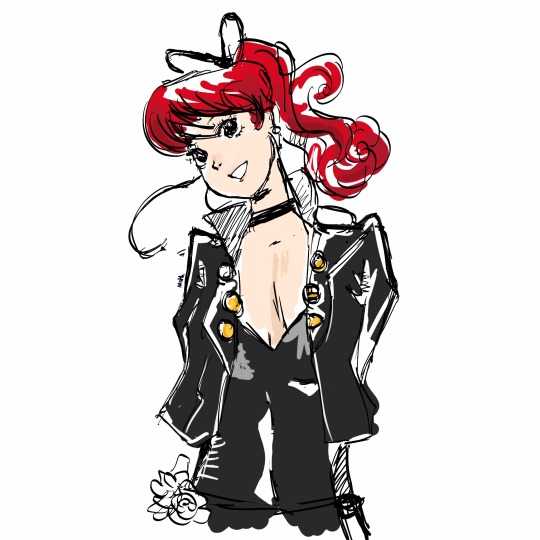


#sumire yoshizawa#kasumi#kasumi yoshizawa#persona 5#persona series#surime art#third image is too large but im too lazy to crop it right now haha
19 notes
·
View notes
Text
"Toshiro Is Sexist," "Toshiro Owns Slaves": What's Really Going on With This Guy?
I've seen a lot of debate on whether or not Toshiro is problematic because he's a slave owner or because he's sexist in the context of his crush on Falin. While I do want to examine his relationship to Falin, I'd like to take a few steps back and unpack his upbringing first. We'll dive into the gender and class dynamics he was raised with and how it impacts his behavior in the main storyline.
Like all people, Toshiro is shaped by the environment he grew up in. Toshitsugu, Toshiro's father and the head of the Nakamoto clan, is the most impactful model of authority and manhood in his life. Toshiro does recognize some of his father's flaws and tries to avoid replicating them. But whether or not he emulates or subverts his father's behavior, Toshitsugu is often the starting point for Toshiro's treatment of others, particularly marginalized people.

The Nakamoto clan exists under a patriarchal hierarchy with Toshitsugu at the top. As noted by @fumifooms in their Nakamoto household post, his wife has more authority than Maizuru. She's able to ban Maizuru from parts of their residence, but despite disliking his infidelity, she can't divorce him or stop him from cheating on her. Their marriage is not an equal partnership.

On an interpersonal level, Toshitsugu and Maizuru also have a fraught relationship. While she does seem to care for him, she's often frustrated by his thoughtless behavior.
For example, he drunkenly buys Izutsumi for her — without considering how she'll have to raise this child — and invades her room in the middle of the night. When he cryptically says, "It's all my fault," she replies, "I can think of a lot of things that are your fault." She calls him an "idiot" and "believes that [Toshiro] will grow up to be a better clan leader than his father," implying that she takes issue with Toshitsugu's leadership.


Because Maizuru and Toshitsugu are described as being "in an intimate relationship" and "seem[ing] to be lovers," Maizuru appears to be a consensual participant. Still, this doesn't negate the large power imbalance between them as a male noble clan leader and his female retainer. This imbalance introduces an insidious undertone to Maizuru's frustration with Toshitsugu. Like Toshiro's mother, Maizuru doesn't have the agency to do as she pleases in their relationship; he has the ultimate authority. For instance, she doesn't seem to want to raise Izutsumi, but she has to anyway.

While Maizuru's role as Toshitsugu's mistress is significant, she's also the Nakamoto clan's teacher and Toshiro's primary maternal figure. She cares deeply for Toshiro: tailing him, feeding him, and taking responsibility even for his actions as an adult. While it might seem sweet that she cares for him like a son at first, Maizuru was notably fifteen years old at the time of his birth. In the extra comic below, he's six years old and has already been in her care for some time. Even if we're being generous and assuming that she didn't start raising him until he was six, she was still only twenty-one at the time she was parenting her boss/lover's child with another woman.

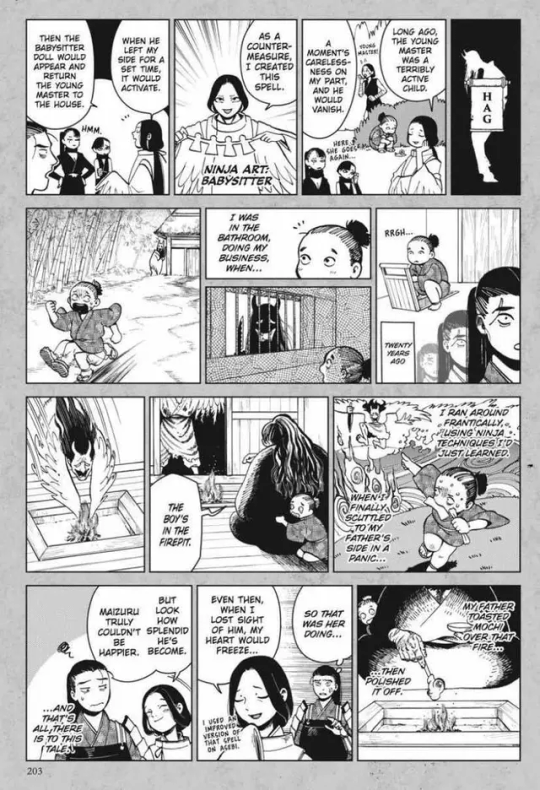
Maizuru's roles as mistress and maternal figure, in addition to her role as retainer, demonstrate the intersection between gendered and class oppression in the Nakamoto household. Despite her original role being a retainer trained in espionage, Toshitsugu presses her into performing gendered labor for him and eventually, Toshiro. She's expected to be Toshitsugu's lover, perform emotional labor for him as his confidant, care for his child, and carry out domestic tasks like cooking. She says, "Even during missions, I was often dragged into the kitchen." If she was a male servant, I doubt she would have been expected to perform these additional tasks. She can't avoid these tasks either, stating that her "own feelings don't factor into it."


Toshitsugu disregards his wife's and Maizuru's desires and emotions to serve his own interests. Because he has societal power over them as a nobleman and in Maizuru's case, her master, neither woman can escape their position in the household hierarchy.
As a result, Toshiro grew up within a structure where men and male nobility, in particular, wield the most societal power. The hierarchical nature of his household and society discourages everyone, including him as a clan leader's eldest son, from questioning and disrupting the existing hierarchy.
The other Nakamoto household members also internalize its sexist, classist power dynamics.
For example, Hien expects that she and Toshiro will replicate the uneven dynamics of the previous generation, regardless of her personal feelings. She sees her and Toshiro's relationship as paralleling Maizuru and Toshitsugu's relationship; she is the closest woman to Toshiro and his retainer, so she's shocked when Toshiro doesn't attempt to begin an intimate relationship with her. Notably, she doesn't have actual feelings for him. Her expectations are centered around the household's precedent of placing emotional, sexual, domestic, and child-rearing labor onto the female servants without any regard for their personal desires.
Hien also probably knows that her position in the household will improve if she is Toshiro's lover because she's seen it improve Maizuru's position. However, the fact that being the future clan leader's lover is the closest proximity she, as a female servant, has to power further reveals the gendered, class-based oppression she and the other women live under.

It's important to note that the Nakamoto clan bought Benichidori, Izutsumi, and Inutade as slaves, so they have less power and agency than Maizuru and Hien. The clan further dehumanizes Izutsumi and Inutade as demi-humans; their enslavement contains an additional layer of racialization.

Toshiro isn't oblivious to the gendered, class, and racial power dynamics of his household. He tries to distance himself from participating in its exploitative power structure. He walls himself off from Hien, who he's known since childhood, to avoid replicating his father's behavior and making his servant into his lover. He disapproves of his father's enslavement of Izutsumi and Inutade, and he lets Izutsumi go when she runs away in the Dungeon.

But does any of this absolve him of his complicity in his household's sexist, classist power dynamics and racialized slavery?
The short answer is absolutely not.
Despite his distaste for his father's exploitation of his servants and slaves, Toshiro still uses them. He refers to his party as "his retainers," and he has them fight and perform domestic tasks for him. You could argue that Toshiro doesn't like to and thus, doesn't regularly use his servants and slaves. In the context of him asking his retainers to help him rescue Falin, Maizuru says, "The only time he ever made any sort of personal request was for this task." But it shouldn't matter whether exploitation is a regular occurrence or not for it to be considered harmful. Toshiro asking Maizuru to cook him a meal still constitutes asking his female servant to perform gendered labor for him. He's also very accustomed to her grooming and dressing him.



Maizuru sees feeding, washing, and even advising Toshiro romantically as fulfilling Toshitsugu's orders to care for his son. They aren't fulfilling a "personal request." But just because her labor has been deemed expected and thereby devalued doesn't mean that it isn't labor or that she isn't performing it.

Maizuru's dynamic with Toshiro is also complicated by her role as his maternal figure. She loves him and wants to take care of him, and she doesn't have a choice in the matter. During Toshiro's childhood, the onus was on Toshitsugu to cease exploiting his lover and release her from servitude, but Toshiro is now an adult man. Seeing as how Maizuru defers to his wishes and calls him "Young Master," they still have a power imbalance that he's passively maintaining. Ideally, he would not ask anything of her until he has the authority to release her from servitude.
Throughout the story, Toshiro acts as if he has no agency and quietly disapproving of his father's actions absolves him of his participation in maintaining oppressive dynamics. While his father still ranks higher than him, he's essentially his father's heir. He has much more power than Maizuru, the highest-ranked servant. At the very least, he could leave his slave-owning household.
Unfortunately, his refusal to confront injustice is consistent with his character's major flaw: he does not express his opinions, desires, or needs. While this character trait obviously hurts his friendships, it also furthers his complicity in the injustices his household runs on.
Toshiro's relationship with eating food — the prevailing metaphor of the series — also parallels his relationship with confronting injustice. Maizuru mentions that he was a sickly child, so the act of eating may have been physically uncomfortable for him. As an adult, his refusal to eat crops up during his rescue attempt of Falin. Denying himself food might have been punishment for not accomplishing important tasks like rescuing Falin and/or a way to maintain control over something in his life when he felt like he'd lost control over the rest of it, again in the context of losing Falin. (Note: I suggest reading this post on Toshiro's disordered eating by @malaierba.)
But he cannot and does not avoid consuming food forever.

Similarly, Toshiro keeps his distance from his retainers and tries not to use them until the Falin situation occurs. His efforts to avoid exploiting his retainers amount to inaction — things he doesn't ask of them or do to them. But his inaction does nothing to dismantle the existing hierarchy that places his retainers under his authority, denies them agency, and often marginalizes them as not only servants or slaves but as women, and he ends up using them as servants and slaves anyways.
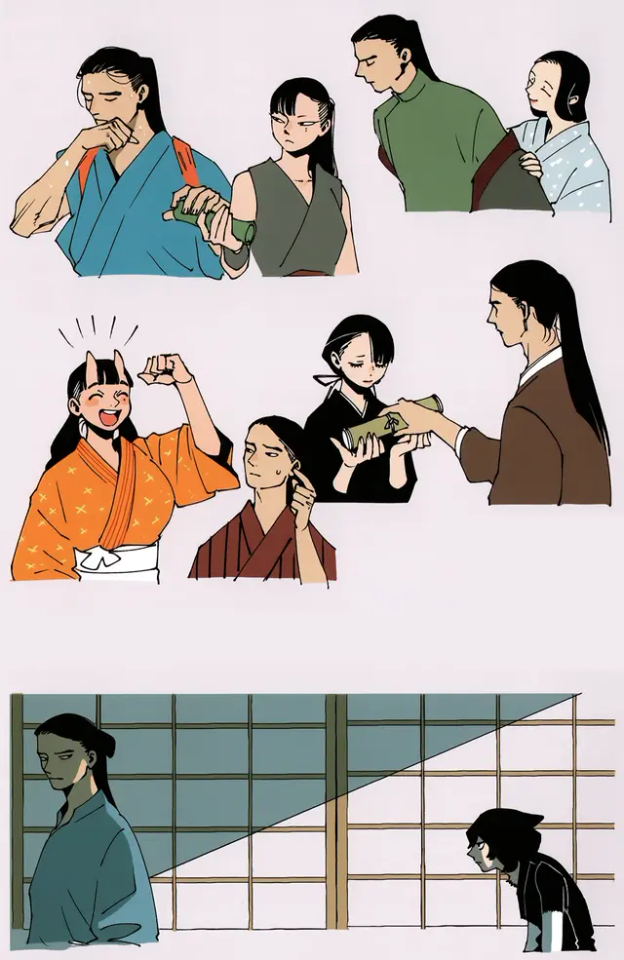
Returning to the narrative's themes of consumption, Toshiro cannot avoid eating just as he cannot avoid perpetuating the exploitative system of his household. The Nakamoto clan consumes the labor and personhood of those lower in the hierarchy. The retainers' labor as spies and domestic servants is the foundation of the clan's existence. Thus, the clan consumes their labor to sustain itself.
Within this hierarchy, the retainers' personhood is also consumed and erased. As Izutsumi describes, they are given different names and stripped of their agency to reject orders or leave. Maizuru and Hien also say their feelings are irrelevant in the context of Toshitsugu's and Toshiro's wants and needs. Both women are expected to comply with whatever is most beneficial and comfortable for the noblemen. Clearly, despite Toshiro's detachment from his household's functions, these social structures remain in place and harm the women under him.

Although we know the Nakamoto clan has male retainers, the choice to highlight the female retainers seems intentional. We're asked to interrogate how not only being a servant or a slave in a noble household impacts a person's life and agency, but how being a woman intersects with being a member of some of the lowest social classes.
Toshiro only distances himself from his father's behaviors of infidelity and exploitation so long as it doesn't take Toshiro out of his comfort zone. He doesn't free his slaves. He's far too comfortable with his female retainers performing domestic labor for him, and he barely acknowledges their efforts; they're shocked when he thanks them for helping him save Falin. He hasn't unpacked his sexist (or classist or racist) biases because he perpetuates his household's oppressive hierarchy throughout the narrative. Considering all of this, he inevitably brings this baggage to his interactions with Falin.

Falin is presumably one of the first women he's had extended contact with that isn't his relative or his family's servant. Because of his trauma surrounding his father and Maizuru sleeping together, he understandably falls for a woman as disconnected as possible from his father and his clan. He seems to genuinely like Falin, respects her boundaries, and graciously accepts her rejection. His behavior towards her is overall kind and unproblematic.
But if Falin had gone with him, she would've likely been devalued and sidelined like the other women of the Nakamoto household. No matter how much he loves Falin, simply loving her cannot replace the difficult work of unlearning his sexism. Love, of course, can and should be accompanied by that work, but by the close of the narrative, we gain little indication that Toshiro acknowledges or seeks to end his part in exploiting and devaluing women and other marginalized people.
A spark of hope does exist. Toshiro expressing his feelings to Laios and Falin suggests that his time away from home has encouraged him to speak up more. Breaking his habit of avoidance may be the first step towards acknowledging his complicity in systems of injustice and moving towards dismantling them.
Special thanks to my very smart friend @atialeague for bringing up Toshitsugu's relationship with Maizuru and the replication of dynamics of consumption and class! <3
954 notes
·
View notes
Text
I've seen people point out that Marcille's emotiveness is something Laios probably appreciates, because he's not great at reading people. I absolutely agree, but I feel like a lot of the time I see this talked about in regard to the ways that her expressive negative feelings are communicated. Which I get! I don't think it's a bad thing to point out at all, and I think it's cool to see people talking about that dynamic.
But you know what else I think Laios really appreciates about Marcille?
The way she radiates joy.
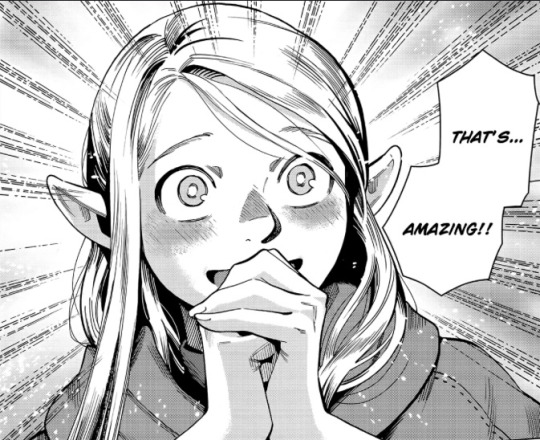
Yes, she explicitly says that her appreciates her smile in chapter 57, but I need to talk about just how much in means to him that she shares her happiness so outwardly.
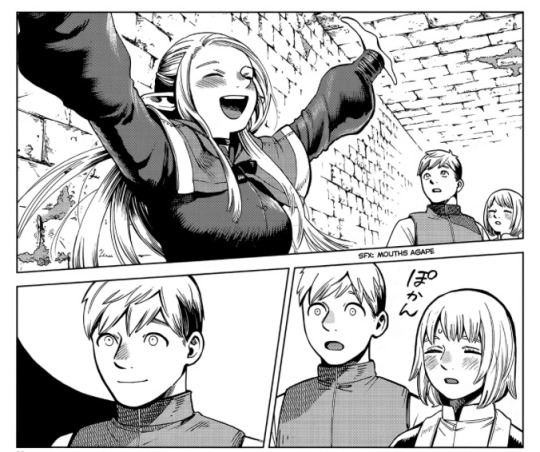
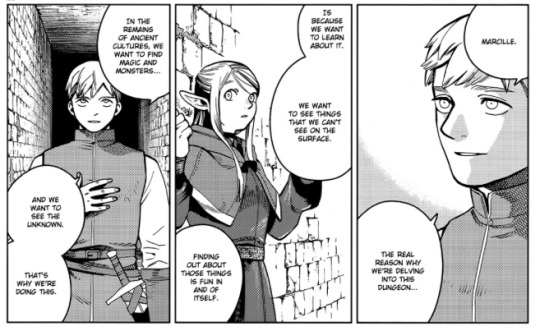
He's able to open up because of it. Able to risk honesty and vulnerability, because he sees how much she cares about the things he and Falin cares about. He can't help but see it!
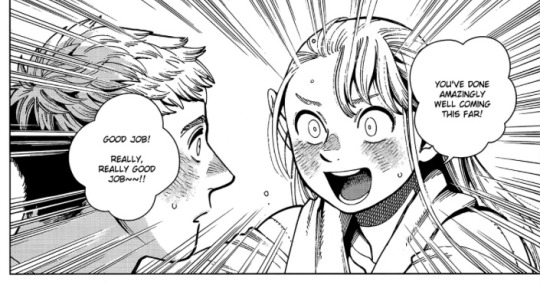
She praises him openly, loudly, and to his face! She is delighted by how much he has learned and how he's grown, and she makes that obvious! Other than Falin, I don't think anyone else is so openly positive about the things Laios is good at, or succeeds at.
And it gives him hope. It helps him trust himself and trust his friends.
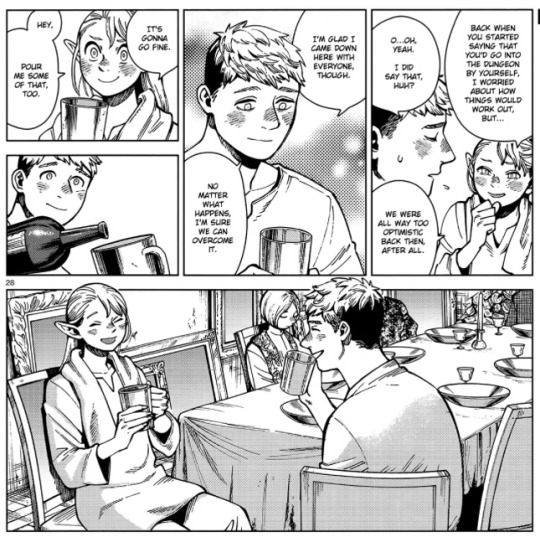
AND THEN!! At the end of the story! When he asks her to stay and help him with the new kingdom, he's hesitant at first. Unsure if he's offering something she wants.
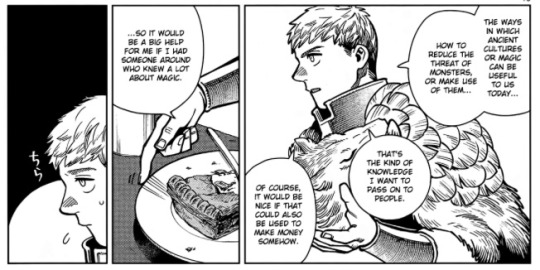
But look!!! Look at her joy!

It's obvious and honest and open and he knows he can trust it. So much so that when she turns around after this and says that she can't actually stay, when she says she has to go west? He still trusts that she meant what she said, and helps her find a way to do what she wants to do. Her joy not only helps him to be honest about his joy, it becomes something he trusts enough that he extorts elves over it.
Her smile is irrefutable! It is an anchor & a compass. It's something he can trust and depend on, even as they descend into the unknown depths of the dungeon, or head into the unknown future.
No wonder he looks forward to it. I look forward to the sunrise, too.
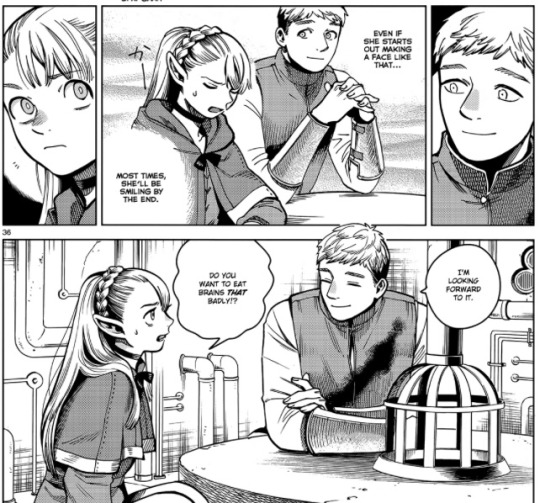
332 notes
·
View notes
Text
I hope I’m not making mindless sleep deprived connections when I say this, but I just noticed that Milsiril tends to wear bigger and longer clothing around her children. Which gave me the thought oh she probably wears them to hide her scars from her children..but I also suck at forming words so y’all are just gonna have to trust me on this one.
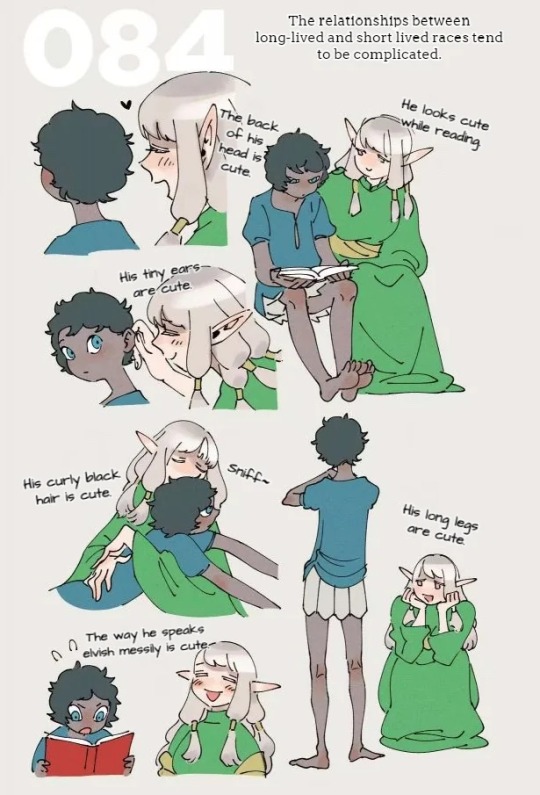
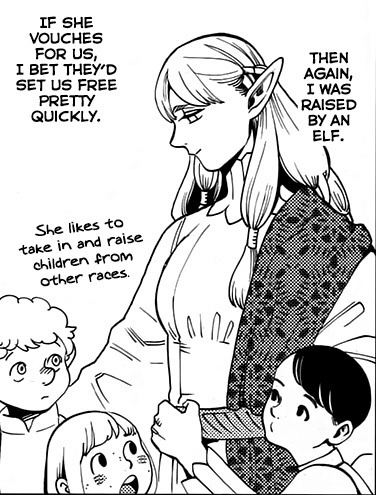
What really caught my attention was these two arts of her wearing two really baggy looking pieces of clothing. In both of these situations she’s with her young children.
Please bear with meee here cuz I know in most of her panels she's in the canary uniform, so we only get to see her in her non work clothes once. In this one extra, her scars visible and she is wearing a short dress, but what I want to highlight is that she is with only elves here.
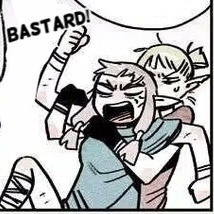

Here is more of her wearing clothing that covers some of her arms! I like to note that in all instances she’s with Kabru..
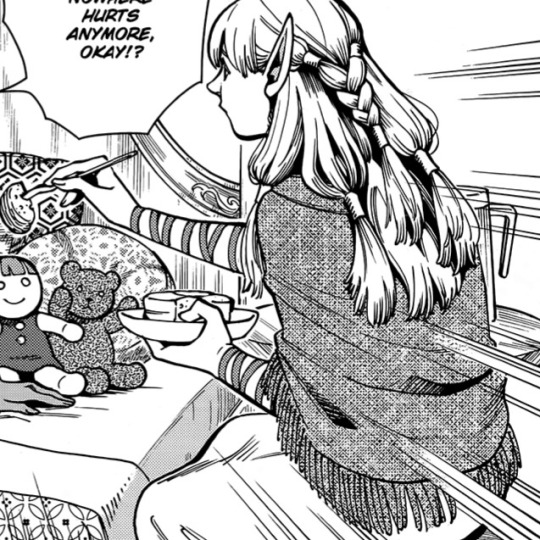
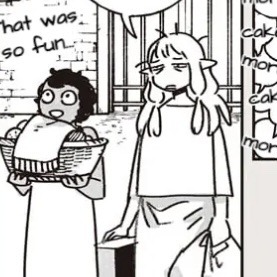
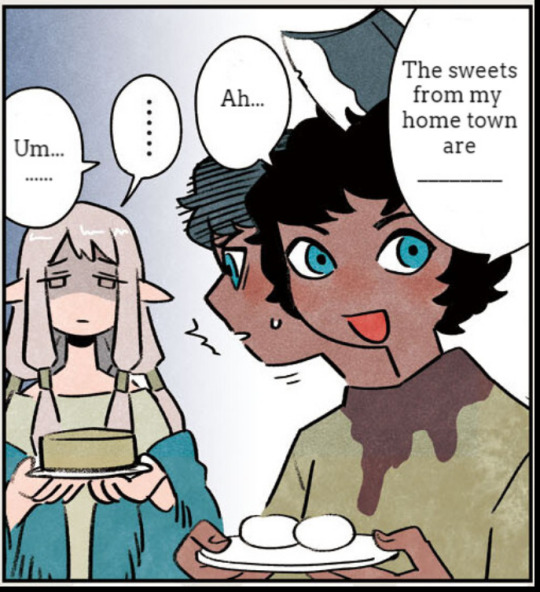
(Even in the first panel she is wearing those arm bracelets that cover up most of her skin in a way. She doesn't always wear them but they're an interesting addition imo.)
BUT This is what sells me a little is this scene from this chapter. Where Milsiril is playing the soft and protective Mother role, feeding Kabru cake, almost kinda baby talking him. She’s using her shawl (?) to cover her arms. Til Kabru brings up the dungeon and wanting to be “strong like her” is when her shawl slowly begins to fall off her shoulders each panel and reveals some nasty scars.
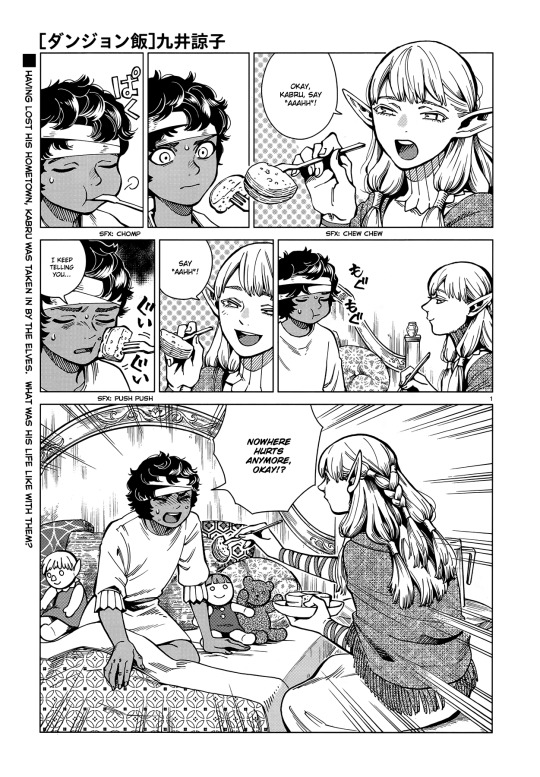
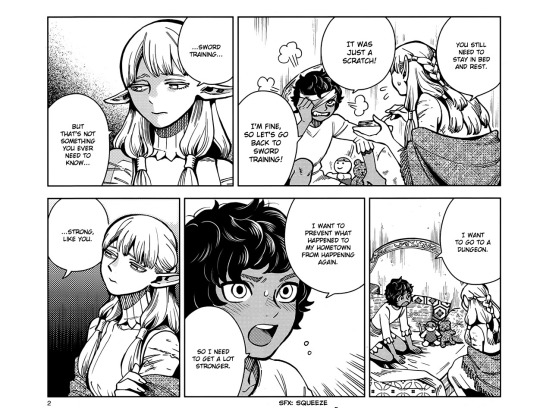
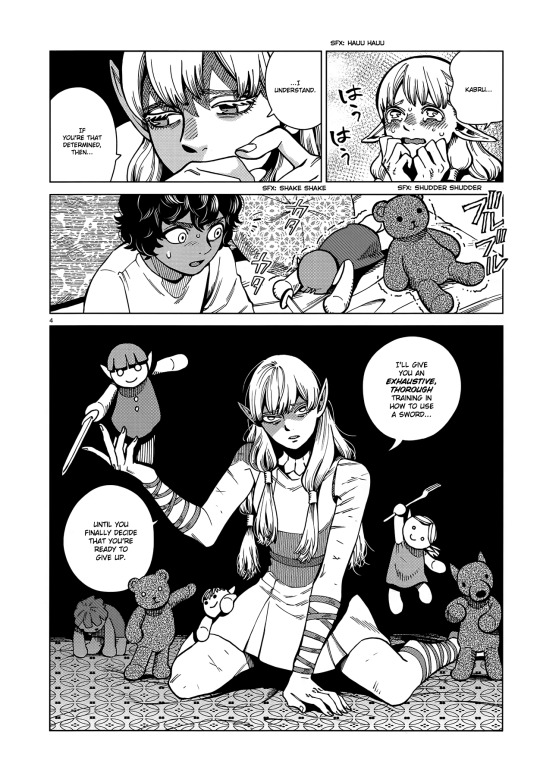
Taking at look at the "Strong like you." panel (middle image, first panel in the middle row) it particularly peeks my interest because I’m so sure Kui did that on purpose. Not to mention when the tone shifts completely and we see Milsiril looking rather scary. This time her scars are on full display.
So going off of the last few panels, I’m going to personally assume she tries to cover them around her children so they don't have any feelings of uneasiness or fear around her. In the instance with Kabru, it’s almost like she's trying to install some fear in him whether that’s to drive him away from the dungeon or just show him what exploring in the dungeon is really like. Whatever is the real reason to all of this is beyond me.
I hope this makes sense and y’all can pick up what i’m tryna put down. I’m so tired feel free to reblog with your own interpretations or additions pls. or if i missed anything thanks.
2K notes
·
View notes
Text
"arent you hungry" in reaction to unthinking self-deprevation response to trauma is going to haunt me forever actually.

something about suppressing your needs to feel safe and in control. something about someone not admiring the endurance or self-control but instead asking "aren't you hungry," a question which you are entirely unequipped to answer. "Aren't you hungry?" Aren't you impressed I can tune it out? I worked hard for that, for everyone else's sake, don't you get it? "Aren't you hungry?" I don't know, stop asking me questions I can't answer, why is answering so easy for you? "Aren't you hungry?" All I'm any good at figuring out is how much longer I can go without eating, and I thought that was the same, but it's not, is it?
12K notes
·
View notes
Text
I've been thinking a lot lately about how Kabru deprives himself.


Kabru as a character is intertwined with the idea that sometimes we have to sacrifice the needs of the few for the good of the many. He ultimately subverts this first by sabotaging the Canaries and then by letting Laios go, but in practice he's already been living a life of self-sacrifice.
Saving people, and learning the secrets of the dungeons to seal them, are what's important. Not his own comforts. Not his own desires. He forces them down until he doesn't know they're there, until one of them has to come spilling out during the confession in chapter 76.
Specifically, I think it's very significant, in a story about food and all that it entails, that Kabru is rarely shown eating. He's the deuteragonist of Dungeon Meshi, the cooking manga, but while meals are the anchoring points of Laios's journey, given loving focus, for Kabru, they're ... not.

I'm sure he eats during dungeon expeditions, in the routine way that adventurers must when they sit down to camp. But on the surface, you get the idea that Kabru spends most of his time doing his self-assigned dungeon-related tasks: meeting with people, studying them, putting together that evidence board, researching the dungeon, god knows what else. Feeding himself is secondary.
He's introduced during a meal, eating at a restaurant, just to set up the contrast between his party and Laios's. And it's the last normal meal we see him eating until the communal ending feast (if you consider Falin's dragon parts normal).
First, we get this:
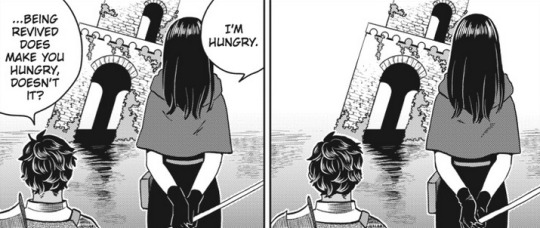
Kabru's response here is such a non-answer, it strongly implies to me that he wasn't thinking about it until Rin brought it up. That he might not even be feeling the hunger signals that he logically knew he should.
They sit down to eat, but Kabru is never drawn reaching for food or eating it like the rest of his party. He only drinks.

It's possible this means nothing, that we can just assume he's putting food in his mouth off-panel, but again, this entire manga is about food. Cooking it, eating it, appreciating it, taking pleasure in it, grounding yourself in the necessary routine of it and affirming your right to live by consuming it. It's given such a huge focus.
We don't see him eat again until the harpy egg.
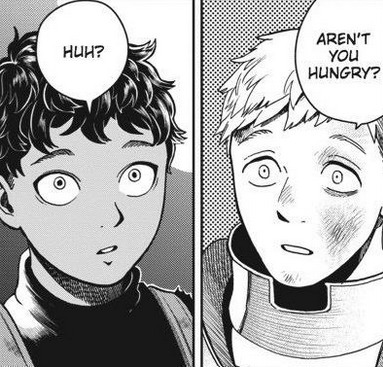
What a significant question for the protagonist to ask his foil in this story about eating! Aren't you hungry? Aren't you, Kabru?

He was revived only minutes ago after a violent encounter. And then he chokes down food that causes him further harm by triggering him, all because he's so determined to stay in Laios's good graces.
In his flashback, we see Milsiril trying to spoon-feed young Kabru cake that we know he doesn't like. He doesn't want to eat: he wants to be training.


Then with Mithrun, we see him eating the least-monstery monster food he can get his hands on, for the sake of survival- walking mushroom, barometz, an egg. The barometz is his first chance to make something like an a real meal, and he actually seems excited about it because he wants to replicate a lamb dish his mother used to make him!
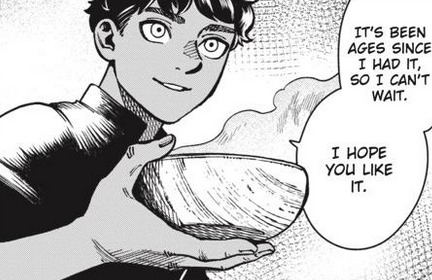
...but he doesn't get to enjoy it like he wanted to.
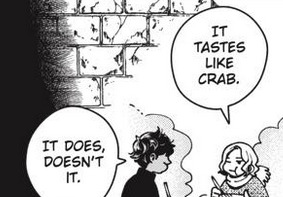
Then, when all the Canaries are eating field rations ... Kabru still isn't shown eating. He's only shown giving food to Mithrun.

And of course the next time he eats is the bavarois, which for his sake is at least plant based ... but he still has to use a coping mechanism to get through it.
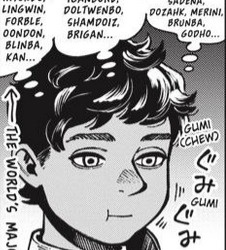
I don't think Kabru does this all on purpose. I think Kui does this all on purpose. Kabru's Post Traumatic Stress Disorder should be understood as informing his character just as much as Laios's autism informs his. It's another way that Kabru and Laios act as foils: where Laios takes pleasure in meals and approaches food with the excitement of discovery, Kabru's experiences with eating are tainted by his trauma. Laios indulges; Kabru denies himself. Laios is shown enjoying food, Kabru is shown struggling with it.
And I can very easily imagine a reason why Kabru might have a subconscious aversion towards eating.


Meals are the privilege of the living.

17K notes
·
View notes
Text
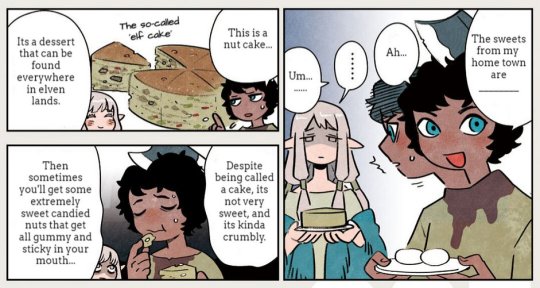



I like how the elves really want you to eat cake
27 notes
·
View notes




